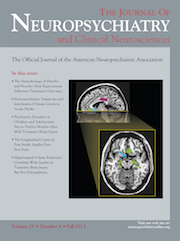To the Editor: Awareness of the role of food supplements for various medical problems has been increasing in recent years. Niacin (Vitamin B3) has been proven to raise HDL and lower triglyceride levels.
1 Niacin is a precursor to several neurotransmitters in the brain, which may have an impact on mood. Niacin sensitivity is inversely correlated with severity of symptoms, and flush deficits were significantly associated with depressed mood and anxiety.
2 Except for hot flushes, it is considered to be a safe medication.
We describe a case of an acute, manic-like psychotic episode that was temporally associated with treatment and dosage of niacin.
“Mr. F,” a 52-year-old man without psychiatric history or psychiatric disorders within his immediate family and no recent stressors in his life. His behavior changed a week before admission and followed an increase in the dosage of niacin, which he took for dyslipidemia. He began niacin, 500 mg QD, 2 months earlier. He complained of hot flushes. Because of the absent effect on his lipid profile, his family physician increased the dose of niacin to 1,000mg QD. Within a week after this dose increase, he displayed elevated mood; labile affect; psycho-motor agitation; a run of thoughts; tangentiality; delusions of grandeur, persecution, and reference; and delusions of thought-broadcasting.
Upon admission, he was severely agitated and negativistic. His CBC and basic chemistry were within normal limits. He did not display gross neurological deficits. He received a single dose of IM haloperidol 10 mg and diazepam 10 mg.
On the next day, his status examination was without any evidence of psychotic or affective signs or symptoms. Mr. F was discharged under treatment with risperidone 1 mg daily and was recommended to avoid taking niacin. He came to follow-up visits during the next week and was without any abnormal findings.
After discharge, he took risperidone for an additional week and stopped on his own. He returned to his past routines, including a full-time job. On a follow-up phone call 5 months later, the patient and his family reported a lack of psychiatric symptoms altogether.
A PubMed search for correlation of niacin and psychotic or affective side effects was negative. However, in a private website that analyzes FDA and user reports of drug adverse events, this search yielded four reports of mania related to niacin treatment.
3This case highlights the possibility of acute, manic-like psychotic episodes caused by high doses of niacin. The role of niacin in the synthesis of amino acids, such as tryptophan, with the resulting stimulation of production of serotonin and dopamine can suggest an explanation of this kind of reaction in a sensitive patient. This case also represents the issue of using alternative e-health resources beyond medical journals.

